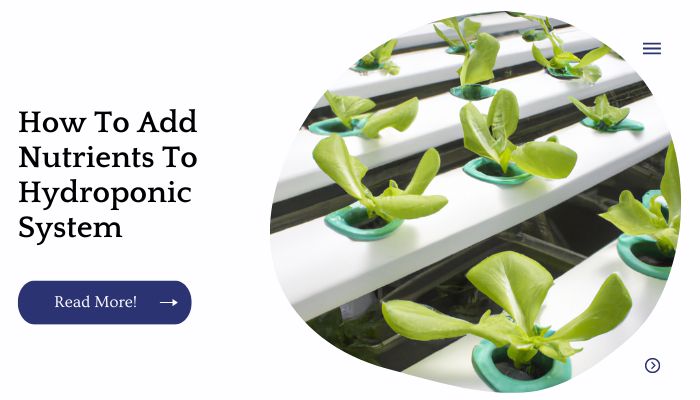In hydroponics, plants are grown in an inert growing medium, such as perlite or gravel, with their roots suspended in the air.
Hydroponic systems use water as a growing medium to feed the plants through nutrients dissolved in the water. The nutrients must be replenished regularly and can be added to the system in many ways.
Use Vitamins And Organic Food Products
There are a number of nutrients, vitamins and minerals that you can add to your hydroponic system to supplement the plants. These include:
- Vitamin B1, B2, B6 and Vitamin 12 (Biotin)
- Vitamin A, C
- Vitamin E
- Iron and Calcium Magnesium Zinc Copper Selenium
Use Composted Manure
Composted manure is a good source of nutrients for hydroponic plants. It’s a good source of nitrogen, phosphorus, and potassium.
The nutrients in composted manure are readily available to the plant once they’re in the root zone. As with any other composting material, make sure it’s free from pathogens before adding it to your system.
Use A Dry Fertilizer
Dry fertilizers are another great way to add nutrients to your hydroponic system. They’re cheap, easy to store and transport, and can be applied in a variety of ways.
Dry fertilizers are especially great for hydroponic systems that use soil as their growing medium because they can be mixed directly into the soil before planting no additional mixing is required! This makes them easier for growers who don’t want or need an extra step when it comes time to plant their crops.
Dry fertilizer is also an inexpensive way to add nutrients if you’re on a budget or don’t want waste any money by overfertilizing your plants (which could lead them being too big).
Use Worm Castings
If you are looking for a nutrient solution that is healthy and full of nutrients, worm castings are a great option.
Worm castings are the end product of worms who eat waste and digest it, excreting the nutrients in the form of worm castings. This makes them a great source of bacteria and good bacteria.
One way that worm castings can be used is to add them directly to your hydroponic system. You could also use these as an additive in your soil or compost tea recipes if you’d like as well!
Use Blood Meal, Bone Meal and Fish Meal
Nitrogen and phosphorus are essential for plant growth. These nutrients are often lacking in soil-less mixes, potting mixes and hydroponic systems.
When plants lack the right levels of nitrogen and phosphorus, they won’t thrive. But luckily there are several organic sources available to help you add these nutrients to your plants’ diet.
One of the best ways to do this is by using blood meal, bone meal and fish meal as a foliar spray on all types of plants.
Use Vermicompost Tea
Adding vermicompost tea to your hydroponic system is a great way to give your plants the nutrients they need for healthy growth.
The liquid is produced by the decomposition of organic matter by earthworms in a worm bin, which results in an incredibly nutrient-rich liquid that can be used as a fertilizer.
Vermicompost tea also contains beneficial microbes, which can help prevent or treat plant diseases without harming the surrounding environment or being toxic to animals that may interact with it.
Because it’s made from organic waste, this type of fertilizer doesn’t contribute to pollution or greenhouse gases like chemical fertilizers do.
Make Your Own Hydroponic Nutrients
A hydroponic nutrient system contains three primary components: the base, the pH buffer, and the micro-nutrients.
You can purchase all of these commercially or make them at home using organic substances like molasses, kelp powder and fish meal. Use a 3:1:1 ratio for your base nutrient solution (or 10 ml of each per liter of water).
If you’re growing seedlings or young plants that are still in their vegetative growth stage (before they flower), then use a 1:1:1 ratio instead (5 ml each per liter). For mature plants on their flowering stage, use a 1:2:2 ratio instead (10 ml of each per liter).
Compost Tea Recipe for Hydroponic Nutrient Solution
Compost tea is a nutrient-rich liquid that contains beneficial microbes and nutrients. It can be used as a foliar spray to provide nutrients to plants, and it also has the ability to treat plant diseases and insect infestations.
The main ingredients for compost tea are water, compost, air (bacteria), oxygen, carbon dioxide (CO2), sunlight (light), and time.
The pH should be between 6.0–7.0 with an electrical conductivity (EC) of 1 milliSiemens per centimeter (mS/cm).
Get To Know Your Nutrient Deficiency Problems In Plants.
When it comes to growing plants, there are a few things you need to know. The first thing is the pH level of your water and how it affects your plants.
If you don’t know what that means then don’t worry because we are going to cover it later in this article.
The second thing is whether or not your plant has a nutrient deficiency problem and if so then which one? It’s important for growers to understand what kind of problem their plants have because without knowing these things then they cannot fix them easily and efficiently without wasting money on ineffective products or soil amendments!
Basic Water Quality for Hydroponics System
Water quality is important for hydroponic systems and the health of your plant. The water you use in your hydroponics system should be of good quality, low in salts, and contain no dissolved solids such as calcium or magnesium carbonates.
Water quality has a direct effect on root zone temperatures, nutrient uptake and pH of your nutrient solution.
It also affects how nutrients are absorbed by plants through their roots. Water from rain or rivers may contain contaminants that can impact the health of plants grown with this water source, so it’s best to use distilled or deionized water if possible
Some Basic Hydroponic Nutrients Requirements For Different Plants
The first step to managing your nutrient levels is knowing the basics of how to check for deficiencies. If you want to grow healthy plants, you need to know what their needs are and how to fix any deficiencies that may occur.
The most common nutrient deficiencies in hydroponics are:
- Nitrogen
- Potassium
- Calcium
Conclusion
As you can see, there are many options for adding nutrients to your hydroponic system. It’s important to note that these methods aren’t just for new growers.
Anyone who wants to use their own plants and not buy expensive commercial products will benefit from learning about how nutrients work in general or how to make their own nutrient solution from scratch.

Hi! My name is Hellen James, and I’m here to help you with your home-maintenance needs. Whether it’s building a better yard or just trying to fix a garden—I can show you how.


